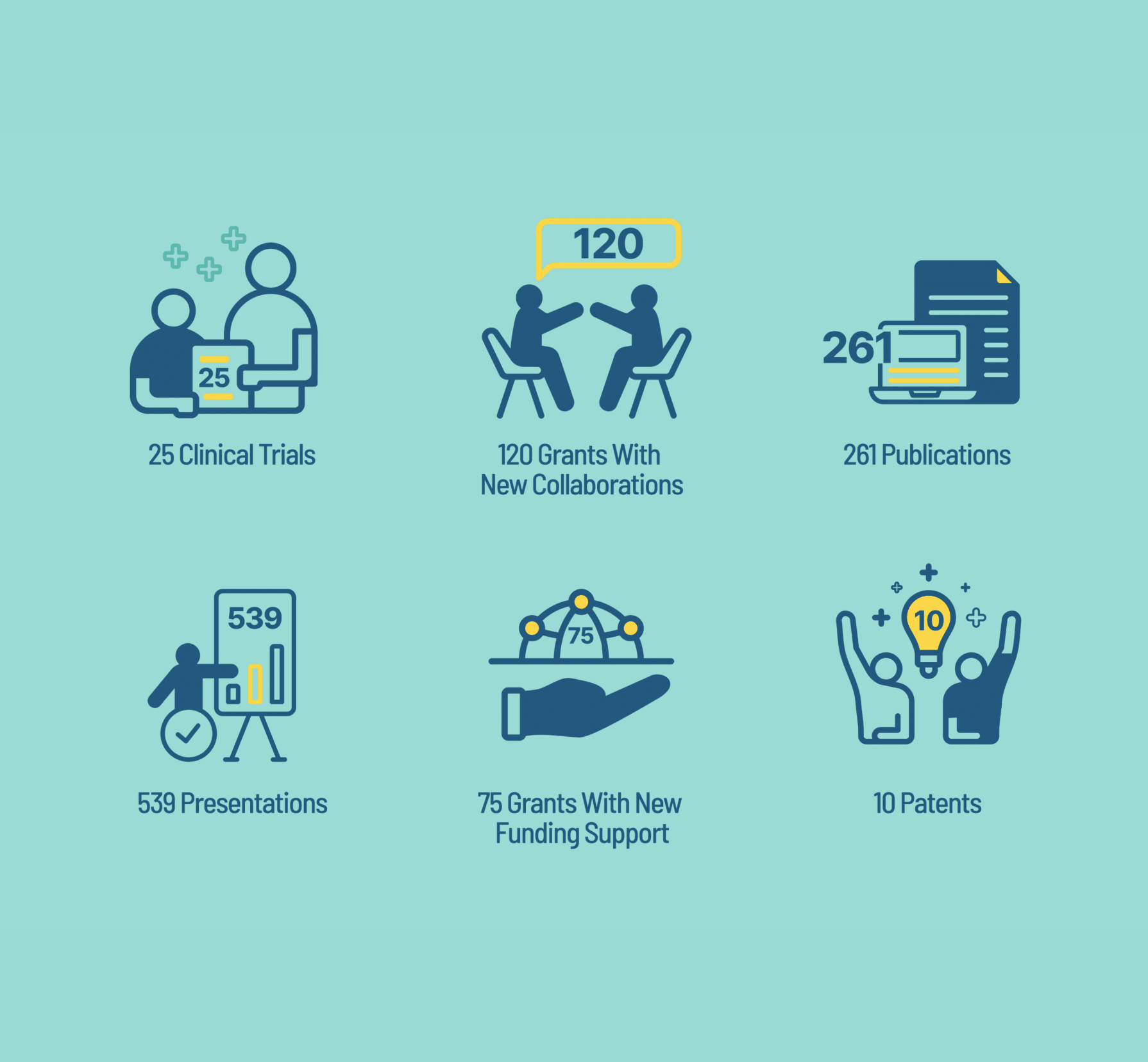January 27, 2025
Research Grants & RFPs
Committed to advancing research across the spectrum of melanoma and supporting researchers at every stage of their careers
Established in 1998, the MRF research grants are a competitive, peer-reviewed program for investigator-initiated research conducted under the purview of our Scientific Advisory Committee. MRF-supported research is open to medical students through senior investigative teams and encompass not only cutaneous melanoma, but also the rare melanoma types such as uveal, mucosal and pediatric melanoma.

Our Partners.
The MRF proactively partners with the National Cancer Institute (NCI), Congress, the Department of Defense (DoD), Society of Melanoma Research (SMR), the American Society of Clinical Oncology (ASCO), other foundations and pharmaceutical companies to develop and collaborate on a broad agenda for melanoma research that takes full advantage of all opportunities, while also sharing challenges.

Our Impact in Research
333
Projects
$26M+
Funding
26
Years
Grant & RFP Opportunities
Please check back in the future for new opportunities.
Opportunities Under Review.
MRF Breakthrough Consortium (MRFBC) Team Award
The purpose of this two-year, $250,000 award ($125,000 each year) is to promote translational melanoma research opportunities to principal investigators (PI) who are from an MRFBC institution. A list of participating MRFBC institutions can be found here. The grant PI must be from an MRFBC institution, additional institutions may include non-MRFBC sites. Applications must be focused on translational melanoma research of cutaneous or rare subtypes such as ocular, mucosal, pediatric and acral lentiginous melanomas. Successful applications will emphasize novel, innovative proposals designed to accelerate research and treatment development for melanoma patients. Additional information including eligibility requirements can be found in the 2025 MRF Breakthrough Consortium Team Award RFP and Proposal Central.
Resident/Fellow Award
The purpose of these one-year, $10,000 awards is to promote research opportunities to resident/fellows early in their careers by funding clinical or laboratory-based research projects focused on better understanding the prevention, early detection, behaviors that impact melanoma risk, biology and treatment of melanoma, including cutaneous, ocular, mucosal, pediatric, etc. In addition to awards focused on any aspect of melanoma research, we are pleased to also offer at least one award focused specifically on ocular melanoma research. Additional information can be found in the 2025 Resident/Fellow Grant RFP and Proposal Central.
MRF Breakthrough Consortium (MRFBC) Pilot Translational Award
The purpose of this one-year, $50,000 pilot proposal award is to focus on novel, innovative clinical/translational melanoma research. The grant principal investigator (PI) must be from an MRFBC institution, CO-PIs/key personnel may be from non-MRFBC sites. A list of participating MRFBC institutions can be found here. Applications must be focused on translational or clinical work that utilizes human specimens, macromolecules derived from the human tissue, or patient reported outcome measures. Successful applications will emphasize novel, innovative proposals designed to accelerate research and treatment development for melanoma patients. Applications are currently closed. Additional information including eligibility requirements can be found in the 2025 MRFBC Pilot Translational Award RFP and Proposal Central.
Established Investigator Award (EIA)
The purpose of these two-year, $125,000 awards is to promote research opportunities to established melanoma researchers, or senior researchers working in closely related fields who wish to move into melanoma research. This year, in addition to general EIAs, the MRF will offer 1) a grant focused on either defining lethal melanoma and/or identifying lethal melanoma biomarkers at the patient, tumor and/or blood level (e.g. patient risk stratifications, gene expression profiles, ctDNA monitoring etc.) in honor of Katie Morgan (Lethal Melanoma EIA or LM EIA) and 2) a grant focused on pediatric melanoma (PED EIA). For the LM EIA, the grant must be focused on either defining lethal melanoma and/or identifying lethal melanoma biomarkers at the patient, tumor and/or blood level. For the PED EIA, the grant must focus on any aspect of pediatric melanoma. Applications are currently closed. Additional information can be found in the 2025 Established Investigator Award RFP and Proposal Central.
Career Development Award (CDA)
The purpose of these two-year, $50,000 awards is to promote research opportunities to junior melanoma researchers to generate the groundwork that can leverage additional grant funding from other funding bodies. As such, recipients must be either postdoctoral fellows with less than five years of postdoctoral experience or a research associate, instructor, assistant professor or the equivalent. Applications are currently closed. Additional information can be found in the 2025 Career Development Award RFP and Proposal Central.
Peer-Reviewed Research Opportunities.
The MRF has been funding peer-reviewed research since 1998. The foundation provides emerging and established scientific investigators with highly sought-after grants that allow them to explore new, high-impact avenues in melanoma research. The types of grants offered are noted below:
Team Science Awards
The largest grant offered by the MRF, a Team Science Award, encourages collaboration across academic disciplines in an institution or among multiple institutions. Team Science Awards are required to address an unmet need or Special Topic area, as defined by the MRF’s Scientific Advisory Committee.
Established Investigator Awards (EIA)
Applicants must have at least a position of Associate Professor and a demonstrated research track record. This award encourages proven researchers to continue research on emerging challenges in melanoma. Ideally, this award will generate data that can justify a much larger competitive grant.
Career Development Awards (CDA)
This award enables young researchers to generate the groundwork that can leverage additional grant funding from other funding bodies. As such, recipients must be either postdoctoral fellows with less than five years of postdoctoral experience or a research associate, instructor, assistant professor, or the equivalent.
Pilot Awards
The goal of this award is to create findings that could then lend themselves to larger, multicenter grant proposals. Both tenured and non-tenured track faculty are encouraged to apply.
Resident/Fellow Awards
This grant is designed to fund clinical or laboratory melanoma research projects for resident/ fellows under the mentorship of a melanoma investigator.
Medical Student Awards
The MRF is committed to introducing students early in their careers to the clinical or research opportunities under the mentorship of an investigator engaged in melanoma research.
MRF Funded Research
Learn MoreView MRF-Supported Institutions
Learn MoreSupported Research Centers
Please hover over state to view Supported Research Centers
Occasionally, we also have special opportunities available that do not adhere to our usual categories.
Specific details and application instructions for each MRF research opportunity will be available in the relevant RFP. Questions regarding the research opportunities above can be directed to the Chief Science Officer at research@melanoma.org



